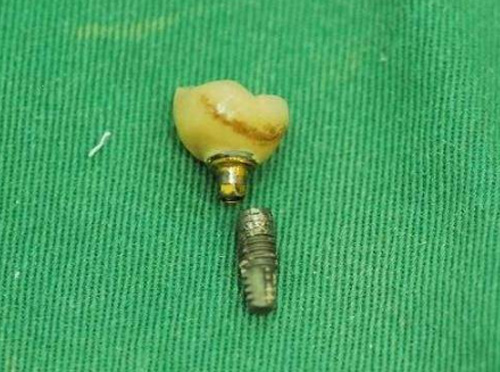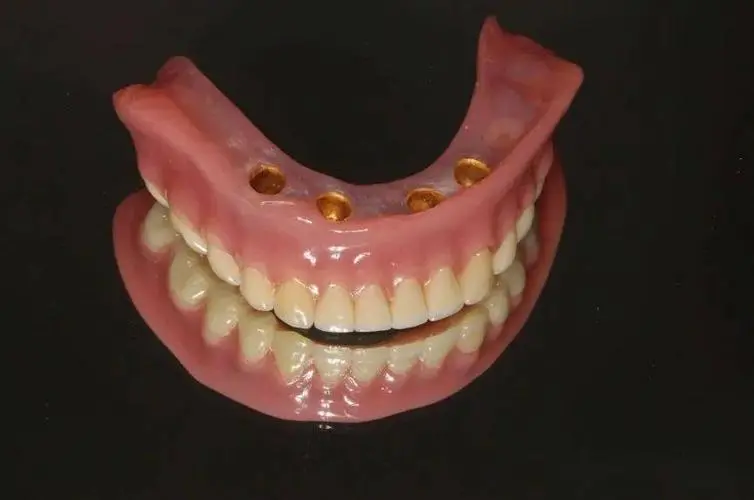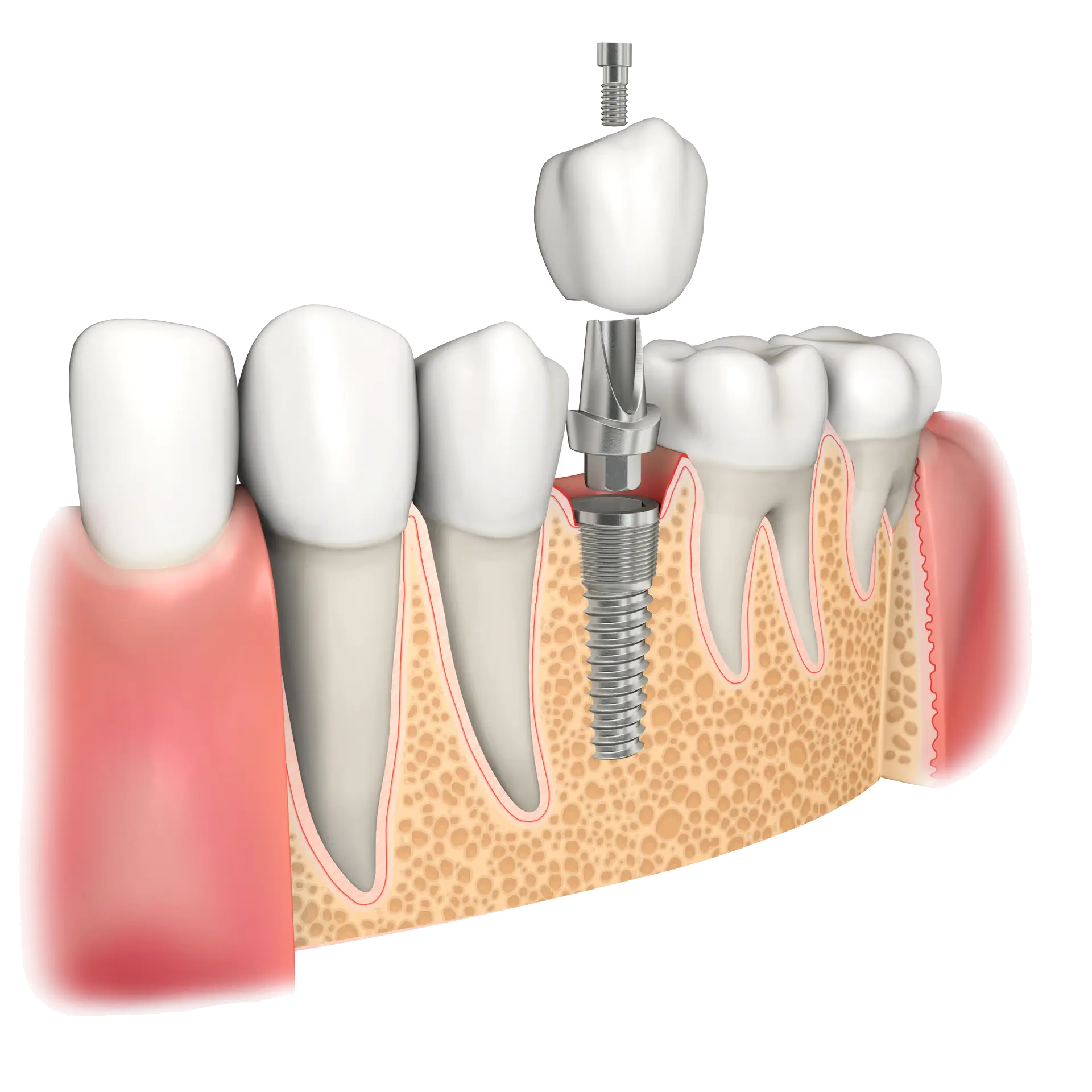Dental implants are a highly reliable and long-lasting method of tooth restoration, significantly improving a patient’s natural smile, oral function, and overall oral health. However, like any medical procedure, dental implants come with certain risks, one of which is the potential loosening or falling out of the screw in the implant.
If you notice the implant screw becoming loose or falling out, it’s crucial to take immediate action. The loosening of the screw may be an early sign of compromised implant stability. If not addressed in a timely manner, it could lead to further loosening of the implant, affecting both its function and lifespan. Therefore, it is essential to contact a dental implant specialist as soon as possible, who will assess the situation and provide the most appropriate solution.
To fully understand and prevent such occurrences, it’s important to explore the possible causes of screw loosening and know the necessary steps to take next.
What is a dental implant screw?
A dental implant screw is a precise fastener used to lock the abutment firmly onto the implant, creating a sturdy and long-lasting framework to replace missing teeth. It is composed of titanium alloy or other biocompatible materials. As the vital component that joins the implant to the abutment, the implant screw is essential to dental implant surgery.
These screws reduce the possibility of rejection since they blend in nicely with human tissue in addition to being robust and resistant to corrosion. Dental implant screws provide a strong contact between the abutment and the implant by precisely designing the threads and controlling torque, which prevents any unneeded movement or loosening.
The success of the overall implant system depends on the stability of the dental implant screw. It immediately impacts the replacement tooth’s cosmetic appearance and chewing performance, in addition to the abutment’s stiffness. The abutment may lose support if the implant screw comes loose or falls out, which might result in infection, bone loss, and other major issues that could endanger the patient’s oral health and the implant’s long-term stability.

Why my dental implant screw fell out
A dental implant screw coming free is often the consequence of many interrelated circumstances. To avoid future issues, keep the dental implant stable, and increase its longevity, it is important to comprehend these factors. The following are some of the main reasons why dental implant screws go loose:
- Bad dental hygiene: Bacteria may build up around implants in cases of poor dental hygiene, which can result in infection and irritation. These infections may impair the bond between the implant and screw over time, leading to the implant becoming looser in addition to affecting the condition of the gums and surrounding bone tissue.
- Low bone density: For stability, a dental implant needs a strong jawbone. A loose screw might result from the implant not being securely secured in the bone if the patient has inadequate bone density. The stability of the screw may be impacted even if bone grafting is used to augment bone mass because of inadequate healing or ongoing bone loss.
- Inadequate implant positioning: An unequal stress distribution on the screw may result from positioning the implant at an improper angle, depth, or location during implant surgery. The connection between the screw and the implant may ultimately become weakened as a result of this unequal tension over time and loosening.
- Too forceful external forces: Bad behaviors including too forceful food chewing, teeth grinding, or using the implant as a tool may put too much strain on the implant. In addition to endangering the implant itself, this pressure raises the possibility of the screw loosening.
Key Signs of Dental Implant Screw Loosening
Timely detection of dental implant screw loosening is essential to take prompt action and prevent the issue from worsening. Here are some clear warning signs to be aware of:
- Implant instability: If you notice the implant wobbling or slightly moving when you gently press it with your tongue or finger, this is a direct sign of screw loosening.
- Persistent pain: If you experience ongoing pain or discomfort around the implant, it may be due to abnormal pressure or irritation caused by a loose screw affecting the surrounding tissue.
- Signs of inflammation and infection: Swelling, redness, or the presence of pus around the implant area strongly suggest a possible screw loosening issue, as loosening may provide an entry point for bacteria.
- Gum recession: If the gum tissue around the implant starts to recede or shrink, it could be due to screw loosening. Without firm support, the gum tissue may no longer maintain its original shape.
- Bite misalignment: If you notice changes in the alignment or stability of your bite when you gently tap or close your teeth, it may be an indirect sign of screw loosening.
- In addition to self-checking for these signs, regular professional dental check-ups are key to preventing and detecting screw loosening early. If you notice any of these symptoms, consult your dentist immediately for evaluation and treatment.
What to Do When a Dental Implant Screw Falls Out
When you discover that a dental implant screw has fallen out, it’s essential to take the following steps to ensure the stability and health of your dental implant:
- Stay calm and cautious: Keep calm and avoid panic. Carefully assess the situation before taking any action.
- Collect the fallen screw. Secure the loose screw and keep it in a safe place. This may assist your dentist in determining the next steps.
- Avoid DIY Solutions: Do not attempt to fix the screw or implant yourself. Improper handling can lead to further complications.
- Seek Immediate Medical Attention: Contact your dentist or implant specialist as soon as possible for a professional evaluation.
- Follow your dentist’s advice: Your dentist may recommend specific steps to protect the implant area or suggest a treatment plan.
- Maintain Oral Hygiene: Keep the affected area clean to prevent infection, but be gentle around the implant site.
- Record and Report Symptoms: Take note of any pain, swelling, or discomfort and report these symptoms to your dentist.
- Schedule Regular Check-Ups and Preventative Care: Regular follow-up appointments can help ensure the long-term success and stability of the dental implant.
In summary, when a dental implant screw falls out, taking immediate action and following professional advice is crucial. Timely intervention and proper care can help ensure the long-term success and stability of the implant.
How to Prevent Dental Implants from Loosening
- Daily Maintenance and Cleaning: Use dental floss or an interdental brush to properly clean food particles and plaque between teeth and around implants in addition to brushing your teeth twice a day. This preserves the integrity of the dental implant, lowers the risk of infection, and promotes oral health.
- Frequent Professional Check-ups: Make time for routine dental cleanings and examinations. Plaque and tartar may be removed from hard-to-reach places with regular cleanings by professionals. Along with assessing the implant’s health, your dentist will take care of any possible problems like screw loosening or bone resorption.
- Balanced Diet: To avoid putting undue pressure on the implant, which might lead to loosening or injury, chew on soft foods or items like ice, hard candies, or nuts. To preserve the implant and the surrounding tissues, choose meals that are softer and easier to chew.
- Observe Medical Advice: Throughout the healing phase after implant surgery, pay close attention to the care recommendations provided by your dentist. To encourage implant healing and stability, this may include restricting certain activities, abstaining from smoking, and taking prescribed drugs.
- Boost dental Health Awareness: Be mindful of your dental health and take immediate action to treat any unusual signs, such as discomfort, swelling, or bleeding gums. These might be precursors to additional oral health problems or implant loosening.
- Utilize Assistive Tools: In accordance with your dentist’s recommendations, you may utilize customized mouth guards or night guards to improve the stability of the implant.
FAQs
What happens when a dental implant screw falls out?
Answer: When a dental implant screw falls out, it can lead to several adverse effects. Firstly, it compromises the stability of the implant, making it unable to securely anchor in the jawbone. Secondly, the exposure of the implant may increase the risk of infection, including localized infections or bleeding, which could even result in implant failure. Therefore, if a dental implant screw falls out, it’s important to seek immediate professional evaluation and treatment.
Why do dental implant screws become loose?
Answer: Dental implant screws may become loose due to several factors. First, physiological issues such as inflammation of soft or hard tissues, osteoporosis, or weakened connections between the screw and surrounding tissues can cause loosening. Secondly, screws can become loose over time due to extended use or the failure of bonding agents. External factors, such as impact or excessive bite force on the implant before complete healing, can also damage the implant and lead to screw loosening.
Is it common for dental implants to fall out?
Answer: While it’s not common for dental implants to fall out, it can happen in certain cases. Causes may include individual differences, poor healing, external trauma, or inadequate maintenance. By selecting a qualified dentist and properly caring for the implant post-surgery, the risk of implant failure can be significantly reduced.
How can a fallen dental implant be repaired?
Answer: Repairing a fallen dental implant depends on the specific situation, and the following options are common:
- Rebonding: If the crown has fallen due to a loose or dislodged screw but the implant remains stable, the dentist can clean the crown and screw areas before reattaching or tightening the screw.
- Bridge Restoration: If the jawbone is unsuitable for a new implant, a fixed bridge or removable denture may be used to restore the area. This may involve filing down adjacent teeth for the bridge or using clips for a denture.
- Re-implantation: If there are significant issues like inflammation or bone loss around the implant, the area may require treatment, and once healed, a new implant can be placed.
Can I eat if my dental implant falls out?
Answer: If a dental implant falls out, it’s recommended to avoid chewing on the affected side before seeking professional repair to prevent worsening the condition or accidentally swallowing the loose parts. Additionally, maintain good oral hygiene and avoid food residue that could lead to infection.
Can I glue my dental implant back in?
Answer: It is not recommended to use glue to reattach a dental implant on your own. The repair of dental implants requires professional medical equipment and expertise to ensure stability and safety. Attempting to glue the implant back may lead to improper attachment, increased risk of infection, or further complications. Therefore, if the implant falls out or loosens, seek immediate help from a qualified dentist.




